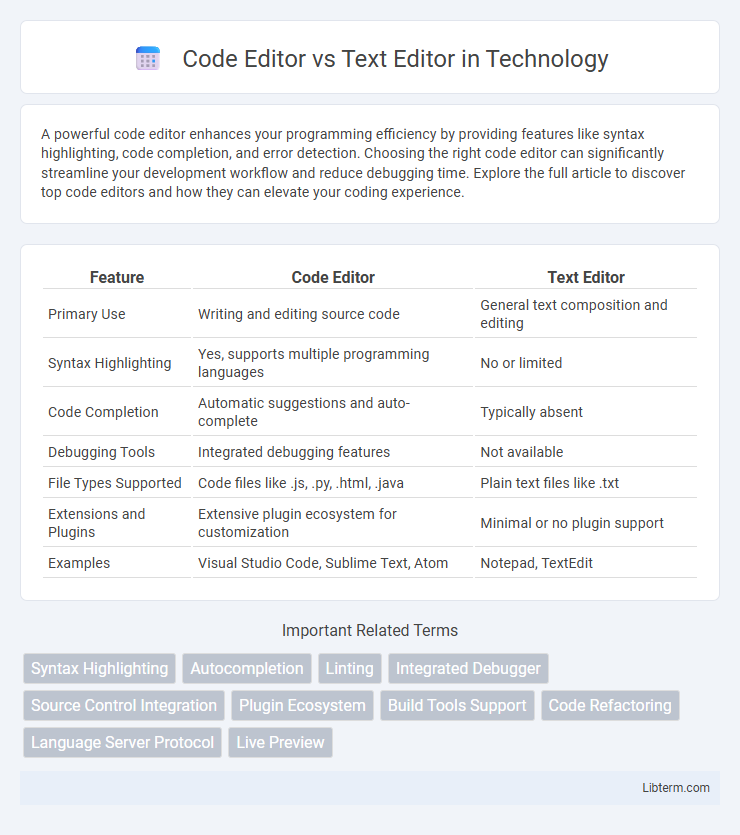A powerful code editor enhances your programming efficiency by providing features like syntax highlighting, code completion, and error detection. Choosing the right code editor can significantly streamline your development workflow and reduce debugging time. Explore the full article to discover top code editors and how they can elevate your coding experience.
Table of Comparison
| Feature | Code Editor | Text Editor |
|---|---|---|
| Primary Use | Writing and editing source code | General text composition and editing |
| Syntax Highlighting | Yes, supports multiple programming languages | No or limited |
| Code Completion | Automatic suggestions and auto-complete | Typically absent |
| Debugging Tools | Integrated debugging features | Not available |
| File Types Supported | Code files like .js, .py, .html, .java | Plain text files like .txt |
| Extensions and Plugins | Extensive plugin ecosystem for customization | Minimal or no plugin support |
| Examples | Visual Studio Code, Sublime Text, Atom | Notepad, TextEdit |
Understanding Code Editors and Text Editors
Code editors are specialized software designed to write and edit programming languages, featuring syntax highlighting, code completion, and debugging tools that optimize the coding process. Text editors offer basic text manipulation capabilities without programming-specific functions, making them versatile for general writing but less efficient for software development. Understanding the distinction helps developers choose tools matching their needs for productivity and code accuracy.
Key Features of Code Editors
Code editors offer advanced features such as syntax highlighting, code completion, and debugging tools that streamline software development processes. Unlike basic text editors, code editors support version control integration, error detection, and customizable interfaces tailored for programming languages. These capabilities significantly enhance coding efficiency and reduce errors, making code editors essential for professional developers.
Core Functionalities of Text Editors
Text editors provide fundamental functionalities such as plain text editing, syntax highlighting, and basic search and replace features, making them ideal for simple coding tasks or note-taking. They support lightweight file handling without integrating advanced tools like debugging, code completion, or version control found in code editors. Common examples include Notepad, Sublime Text, and Vim, favored for their speed and simplicity in editing raw text files.
Advantages of Code Editors for Developers
Code editors provide developers with advanced features such as syntax highlighting, code completion, and error detection that significantly enhance coding efficiency and accuracy. Integrated debugging tools and version control integration streamline the development process, reducing errors and facilitating collaboration. These capabilities make code editors indispensable for complex programming tasks compared to basic text editors.
Benefits of Using Text Editors
Text editors offer lightweight, fast performance ideal for quick code edits or note-taking, consuming minimal system resources compared to code editors. They provide unparalleled flexibility by supporting various file types without imposing formatting or syntax rules, making them suitable for a broad range of tasks from coding to documentation. Text editors also enable customization through plugins and macros, enhancing productivity with a streamlined interface tailored to individual workflows.
Code Editor vs Text Editor: Performance Comparison
Code editors are designed with features like syntax highlighting, code completion, and debugging tools that optimize software development efficiency, whereas text editors primarily focus on basic text manipulation without specialized coding capabilities. Performance in code editors often includes faster code parsing and error detection, enabling developers to write and debug code more quickly compared to the minimal processing overhead in text editors. Benchmark tests show that modern code editors handle large files and projects with better resource management, improving overall coding performance and productivity.
Customization and Extensions: Which Editor Wins?
Code editors like Visual Studio Code and Sublime Text offer extensive customization through themes, keyboard shortcuts, and support for a wide range of plugins that enhance coding productivity. Text editors such as Notepad++ provide basic extension support but generally lack the advanced integration features found in dedicated code editors. The richer ecosystem of extensions and customizable options in code editors typically makes them the superior choice for developers seeking tailored workflows and enhanced functionality.
Use Cases: When to Choose Each Editor
Code editors like Visual Studio Code and Sublime Text are ideal for software development as they provide syntax highlighting, debugging tools, and code completion, enhancing productivity for programming tasks. Text editors such as Notepad or TextEdit are best suited for simple text editing, note-taking, or editing configuration files where lightweight and minimal features are preferred. Choosing between these editors depends on the complexity of the task, with code editors favored for development environments and text editors for straightforward text manipulation.
Popular Code Editors and Text Editors
Popular code editors like Visual Studio Code, Sublime Text, and Atom offer advanced features such as syntax highlighting, debugging tools, and integrated version control that enhance programming efficiency. Text editors like Notepad, TextEdit, and Vim provide lightweight and fast environments for plain text manipulation without specialized coding features. Developers often choose code editors over text editors for complex projects due to robust plugin support and language-specific functionalities.
Final Verdict: Choosing the Right Editor for Your Workflow
Choosing the right editor depends on the complexity of your projects and your specific needs. Code editors like Visual Studio Code or Sublime Text offer advanced features such as syntax highlighting, debugging, and version control integration ideal for software development. Text editors like Notepad or TextEdit provide simplicity and speed for quick notes or basic file edits, making them suitable for straightforward tasks.
Code Editor Infographic

 libterm.com
libterm.com